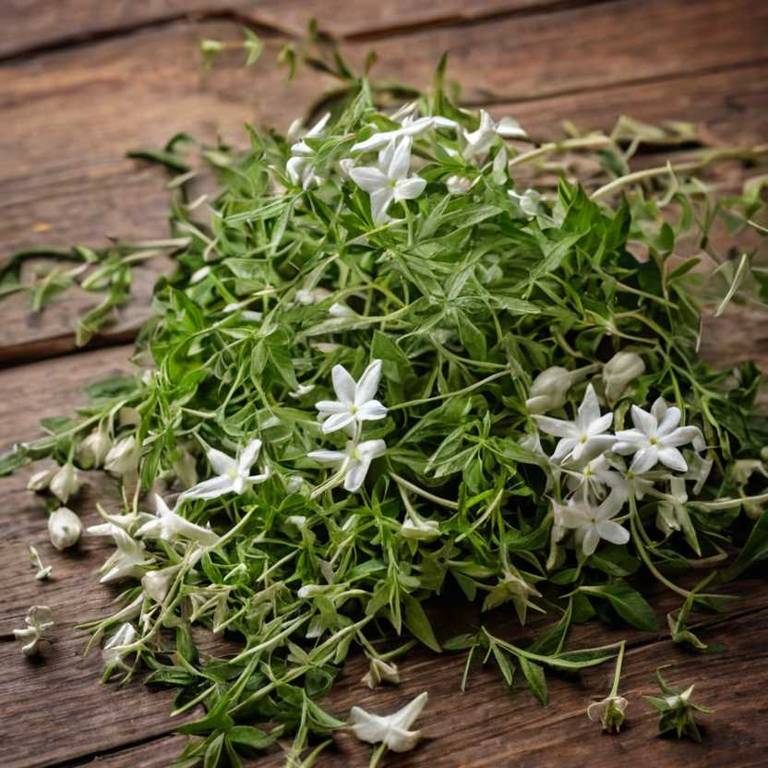10 Best Jasminum Grandiflorum Preparations

The best medicinal preparations of Jasminum grandiflorum are teas, decoctions, tinctures, essential oils, and syrups, each offering unique therapeutic benefits.
Jasmine tea is commonly used to promote relaxation and improve sleep quality.
Decoctions made from the plant’s flowers or leaves are valued for their calming and antispasmodic properties.
Tinctures provide a concentrated form of the herb’s active compounds, often used for digestive support.
Essential oils derived from jasmine are popular in aromatherapy for their mood-enhancing and stress-relieving effects, while syrups are used to soothe respiratory ailments and coughs.
Below there's a list of the 10 best herbal preparations of jasminum grandiflorum for medicinal purposes.
1. Teas
Jasminum grandiflorum teas is commonly used to promote relaxation, alleviate stress, and improve sleep quality.
This herbal preparation is widely employed to treat ailments such as anxiety, insomnia, and digestive issues. It is also used in traditional medicine to soothe headaches and reduce inflammation. The bioactive constituents responsible for its medicinal properties include flavonoids, alkaloids, and essential oils, which contribute to its calming and anti-inflammatory effects.
These compounds work together to support both mental and physical well-being.

2. Decoctions
Jasminum grandiflorum decoctions is commonly used to treat respiratory and digestive disorders, as well as to promote relaxation and improve sleep quality.
These decoctions are often employed in traditional medicine to alleviate symptoms of coughs, bronchitis, indigestion, and anxiety. The bioactive constituents responsible for these effects include flavonoids, alkaloids, and essential oils, which possess anti-inflammatory, antispasmodic, and sedative properties. Additionally, the decoctions may help in reducing stress and enhancing overall well-being.
Due to their soothing and calming effects, they are also used to support mental health and ease nervous tension.

3. Tinctures
Jasminum grandiflorum tinctures is commonly used to treat ailments such as anxiety, insomnia, and digestive issues.
These tinctures are also used to alleviate symptoms of colds, headaches, and skin irritations. The bioactive constituents responsible for its medicinal properties include flavonoids, alkaloids, and essential oils. These compounds contribute to the plant's calming, antispasmodic, and antimicrobial effects.
Overall, Jasminum grandiflorum tinctures are valued for their soothing and therapeutic benefits in traditional and complementary medicine.

5. Syrups
Jasminum grandiflorum syrups is commonly used to alleviate respiratory conditions, such as coughs, bronchitis, and asthma, due to its soothing and expectorant properties.
These syrups are also used to treat digestive issues like indigestion and nausea, and they may help in reducing stress and promoting relaxation. The most common medicinal uses include treating respiratory infections, calming the nervous system, and aiding in sleep disorders. The bioactive constituents responsible for these effects include essential oils, flavonoids, alkaloids, and saponins, which have antimicrobial, anti-inflammatory, and sedative properties.
These compounds work together to provide the therapeutic benefits associated with Jasminum grandiflorum syrups.

6. Capsules
Jasminum grandiflorum capsules is commonly used to treat ailments related to the respiratory system, such as coughs, colds, and bronchitis, as well as for digestive issues like indigestion and bloating.
They are also used to alleviate stress, anxiety, and insomnia due to their calming effects. The most common medicinal uses include supporting respiratory health, improving digestion, and promoting relaxation. The bioactive constituents responsible for these effects include essential oils, alkaloids, flavonoids, and saponins, which have antimicrobial, anti-inflammatory, and sedative properties.
These compounds work together to provide the therapeutic benefits associated with Jasminum grandiflorum.

7. Lozenges
Jasminum grandiflorum lozenges is commonly used to alleviate symptoms of respiratory tract infections, sore throat, and cough.
These lozenges are often employed to treat ailments such as bronchitis, laryngitis, and common cold due to their soothing and antimicrobial properties. The bioactive constituents responsible for these effects include essential oils, flavonoids, and alkaloids, which possess anti-inflammatory, antiseptic, and expectorant qualities. These compounds help reduce throat irritation, inhibit bacterial growth, and ease mucus expulsion.
As a result, Jasminum grandiflorum lozenges are valued in traditional and complementary medicine for their therapeutic benefits in respiratory health.

8. Oils
Jasminum grandiflorum oils is commonly used to treat skin conditions, respiratory issues, and as a calming agent for stress and anxiety.
The most common medicinal uses include alleviating symptoms of asthma, bronchitis, and skin infections, as well as promoting relaxation and improving sleep quality. The bioactive constituents responsible for these effects include essential oils such as linalool, benzyl acetate, and methyl benzoate, which possess antimicrobial, anti-inflammatory, and sedative properties. These compounds contribute to the oil's ability to reduce inflammation, fight bacterial infections, and induce a soothing effect on the nervous system.
Overall, Jasminum grandiflorum oils are valued for their therapeutic benefits in both traditional and modern herbal medicine.

9. Creams
Jasminum grandiflorum creams is commonly used to treat skin conditions, inflammation, and promote wound healing.
These creams are often applied topically to alleviate symptoms of eczema, psoriasis, and minor burns. The most common medicinal uses include reducing skin irritation, soothing inflammation, and enhancing skin regeneration. The bioactive constituents responsible for these effects include flavonoids, alkaloids, and essential oils, which possess anti-inflammatory, antimicrobial, and antioxidant properties.
These compounds work synergistically to provide therapeutic benefits for various dermatological issues.

10. Linctuses
Jasminum grandiflorum linctuses is commonly used to soothe respiratory conditions such as coughs, bronchitis, and asthma due to its expectorant and antispasmodic properties.
The most common medicinal uses of this herbal preparation include treating coughs, sore throats, and respiratory infections by helping to loosen mucus and reduce inflammation in the airways. The bioactive constituents responsible for these medicinal effects include volatile oils, alkaloids, flavonoids, and saponins, which exhibit antimicrobial, anti-inflammatory, and bronchodilatory actions. These compounds work synergistically to provide relief from respiratory discomfort and enhance immune response.
This preparation is often used in traditional and complementary medicine for its calming and therapeutic effects on the respiratory system.
